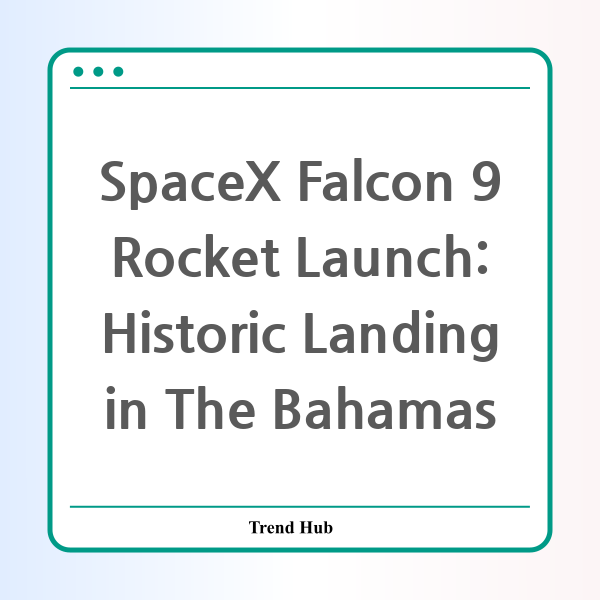* This website participates in the Amazon Affiliate Program and earns from qualifying purchases.

On February 18, 2025, SpaceX made history with its Falcon 9 rocket, achieving a remarkable milestone by landing its booster off the coast of the Bahamas for the very first time. This unprecedented event marks a significant step forward for the aerospace industry, particularly for small countries like the Bahamas, as they tap into the global innovation landscape.
The Falcon 9 rocket lifted off from Cape Canaveral Space Force Station, Florida, at 6:22 PM EST, successfully delivering 23 Starlink satellites into orbit. The booster made its descent back to Earth, landing on the droneship "Just Read the Instructions" stationed in the Atlantic Ocean—specifically near Exuma Island in the Bahamas—approximately eight minutes after launch. This mission is part of SpaceX's ongoing efforts to expand global internet access through its Starlink project.
This launch not only represents a technological achievement but also symbolizes new opportunities for The Bahamas. Isaac Chester Cooper, Deputy Prime Minister of The Bahamas, highlighted the significance of this collaboration, stating, "It's the first international landing in the Bahamas — in the Exuma sound, which is significant in and of itself. It puts us at the cutting edge of innovation." For a nation with a population of just 400,000, participating in the aerospace industry is a monumental opportunity.
The Falcon 9 rocket in this mission was flown for its 16th time, showcasing SpaceX’s commitment to reusability and sustainability in space travel. This mission also marked SpaceX's 21st launch attempt for the year 2025, further demonstrating the company’s robust launch schedule. Of the 21 launches, a significant number have been dedicated to the Starlink project, which aims to provide high-speed internet globally.
Launch day conditions were remarkably favorable, with the 45th Weather Squadron forecasting a 95% chance of good weather at liftoff. This was critical to ensuring the mission's success, as adverse weather conditions can lead to delays and potential safety issues during a launch.
For residents in the vicinity, it was noted that this particular launch trajectory might generate louder sounds than usual as the Falcon 9 ascended towards its target. SpaceX cautioned that there could be audible sonic booms during the landing, depending on weather conditions at the time.
As we look forward to what the future holds, the success of the Falcon 9 landing in the Bahamas sets a precedent for space missions in international waters. This innovative step opens doors for future collaborations and paves the way for more nations to engage actively in aerospace projects, transforming the global perception of space exploration and satellite deployment.
With continuous advancements in reusable rocket technology, SpaceX is not only leading the charge in commercial spaceflight but also fostering international partnerships that can help smaller countries stand at the forefront of space innovation. We will eagerly watch how this new chapter for the Bahamas unfolds in the coming years.
* This website participates in the Amazon Affiliate Program and earns from qualifying purchases.